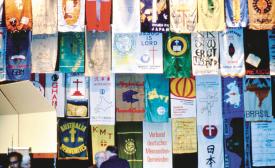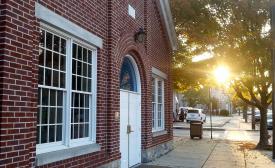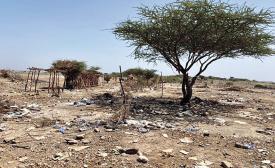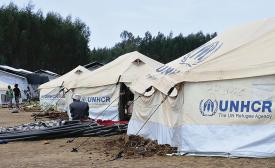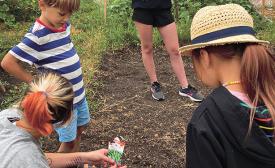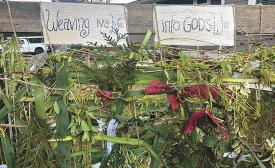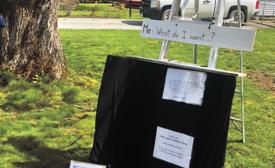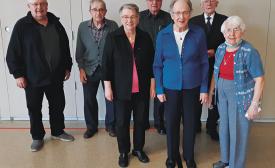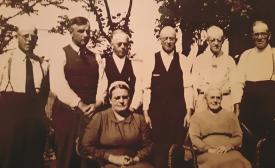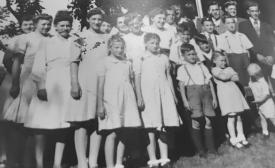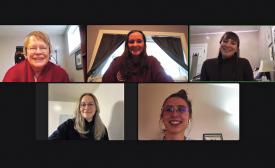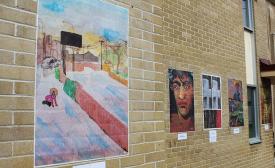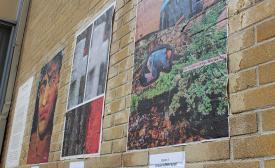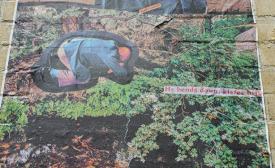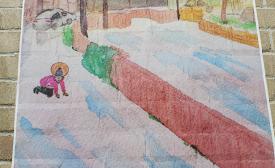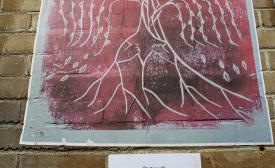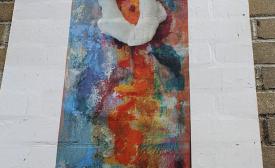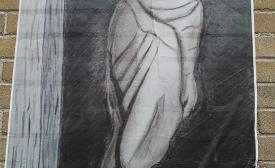Volume 26, Number 9
Speaking of faith
“How do we speak of our faith in a society of many faiths and no faith, a society that has seen all too well the harm the church can inflict in the name of Jesus?”
Justice in the name of Jesus
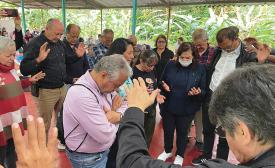
At a recent annual gathering, Colombian Mennonites pray for outgoing denominational president Yalile Caballero, who was an influential advocate for peace and justice. Jeanette Hanson, MC Canada’s director of International Witness, says of the Colombian Mennonites that they do ‘amazing peace and justice work because they love Jesus.’ Reports produced by Justapaz, the peace and justice arm of the Colombian Mennonites, weave an overt spiritual intimacy into documentation of human-rights violations. (Photo by Jeanette Hanson)
Some Mennonites raise their hands when they sing. Others don’t.
Some attend climate rallies and examine decolonization. Others don’t.
Some Mennonites hear sermons focused on the Word and personal relationship with Jesus. Others hear sermons that draw on Pete Enns; Mary Oliver, a modern day mystic; or the Intergovernmental Panel on Climate Change.
Readers write: May 2, 2022 issue
Ottawa citizen offers different view of life under the ‘freedom convoy’
Re: First letter of “Two views on the ‘freedom convoy,’ ” April 4, page 7.
Reflection on Ukraine
MWC Kansas banners
The variety of banners at the 1978 Mennonite World Conference assembly in Wichita, Kan., is a representation of the diversity of people at the assembly, with 9,500 people registered from 44 counties, including Canada.
Meetinghouses
I spent my high-school years in a congregation that was proud of our basketball hoops. Greenbelt Baptist Church decided to use public schools for worship and Sunday school, homes for Bible study, and a community centre for weekly youth events. This was a very intentional way of being visible and connected to the local community.
‘Come over and help us so that we can help the needy ones’
Pastor Desalegn Abebe’s message to North American Mennonites is simple. Abebe is the head of Meserete Kristos Church (MKC), the Anabaptist denomination in Ethiopia, where 17 months of civil violence has led to 12 MKC churches being burned, 44 displaced and 163 full-time ministers and their families displaced and without income.
Drop-in program connects kids with creation
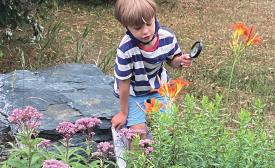
Earthkeepers Kids Club, a collaboration of Jubilee Mennonite Church and A Rocha Manitoba, aims to connect children with creation. (Photos courtesy of A Rocha Manitoba)
Many children today live in a nature deficit. As screens constantly command their attention, parents tighten their protective grip as dangers outside seem to increase, and a multi-year pandemic continues to spread. Children are spending increasing amounts of time inside at home.
Faith and art in Yarrow
Walking, biking or driving through twelve Stations of the Cross on Good Friday, April 15, residents of Yarrow, B.C., experienced the story of Christ’s crucifixion and resurrection together through interactive and creative artwork.
Remembering the passage of time
John L. Erb and Barbara Oesch were Amish Mennonites who farmed in Wellesley Township in southwestern Ontario in the late 1800s. They attended Maple View Mennonite Church. Together they raised eight children and had 29 grandchildren.
Peacebuilding and relationship building go hand in hand
It’s hard to imagine when Ben Borne finds time to sleep.
“I have four jobs,” he says with an easy laugh. “It’s busy, but I love what I do.”
Borne works for Mennonite Central Committee (MCC) Saskatchewan, teaches at First Nations University of Canada, and is the co-president/co-founder of Symmetry Public Relations.
Pastor reaches out to young adults using social media
Anna-Lisa Salo, pastor of Bergthal Mennonite Church in Didsbury, has taken advantage of Zoom’s free 40 minute limit. Two years ago, she reached out to four young women from her congregation who were heading off to post-secondary institutions.
Local artists make Stations of the Cross public
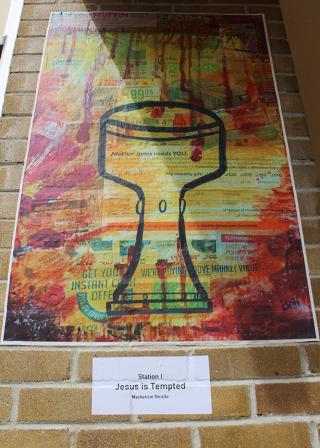
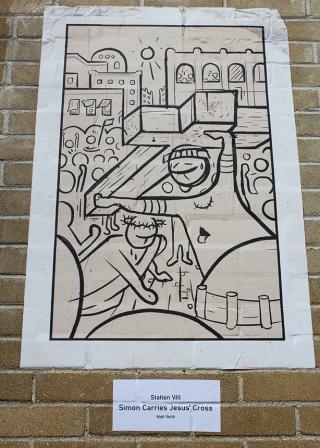
During Holy Week, bright pops of colour appeared in a downtown alley amid the brown slush and litter of a Winnipeg spring.
Christ in you
At the heart of the Christ path is a radical notion that our true identity is found in Christ. Paul says it is no longer he who lives, but Christ who lives in him. He says our true identity, our true self, is “Christ in you.” What does this mean?
A different frame of reference
When I ponder the question of what Mennonites and Anabaptists can bring to the conversation about climate change, I think about the language that many governments and corporations use. The words “fight,” “tackle” and “battle” are commonly used when discussing the imperative to quickly solve the climate crisis.
Discussion event to explore the climate crisis
Canadian Mennonite is launching an online discussion series exploring current events that are impacting the church and wider world, and the climate crisis is the subject of the first event.





